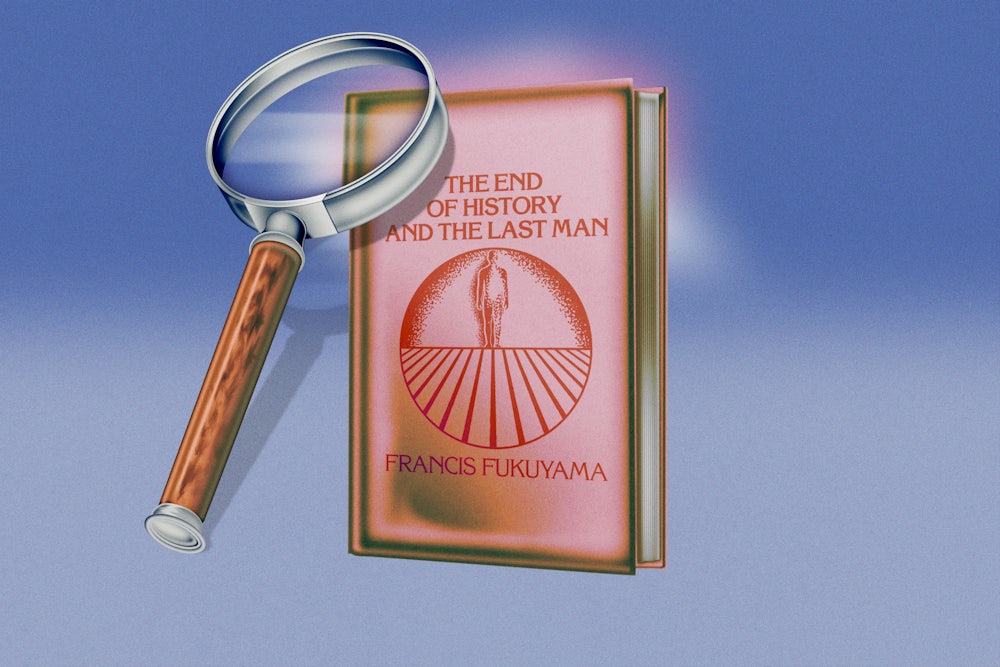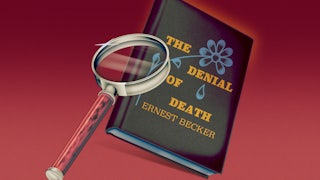In 1989, Francis Fukuyama, a little-known Sovietologist and deputy director of the State Department’s Office of Policy Planning, published an article in a Washington journal, The National Interest, that made an audacious, epochal claim—that the world had reached “the end point of mankind’s ideological evolution and the universalization of Western liberal democracy as the final form of human government.”
With the rapid discrediting of communism, the great ideological struggles of the 20th century had ended, and economic and political liberalism had scored “an unabashed victory.” While future events would obviously still occur, growing economic liberalization and “the ineluctable spread of consumerist Western culture” would make large-scale conflict far less likely and reduce global tensions.
Fukuyama’s claims were met with howls of criticism. “At last, self-congratulation raised to the status of philosophy!” sneered Christopher Hitchens, “The End of History?” was “The Beginning of Nonsense,” wrote Strobe Talbott, then-editor at large for Time magazine and later U.S. Ambassador to Russia. “I don’t believe a word of it,” scoffed Irving Kristol, who happened to be the founder and publisher of The National Interest.
To this day, whenever a new conflict breaks out, a democracy regresses, or global events seem to spiral out of control, critics besmirch Fukuyama’s misplaced optimism about the future. To many, he was a modern-day Pangloss who failed to understand the harsh, brutish elements of both international affairs and human nature.
But more than 35 years later, re-reading Fukuyama’s original article is a revelation. History has proven his thesis largely correct. Indeed, much of the criticism of “The End of History?” comes from those who simply fail to appreciate his argument.
In a sense, Fukuyama was tripped up by the title of his essay, “The End of History?” (everyone seems to forget there was a question mark at the end). Never mind that he explains “the end of history” is a notion propagated by the German philosopher Friedrich Hegel and most famously promoted by Karl Marx. To the layman’s ear, the idea that history has ended is a wildly triumphalist and easily misunderstood claim.
Yet, Fukuyama’s argument is oddly straightforward and even uncontroversial. Liberal democracy’s two greatest ideological competitors—fascism and communism—had taken their best shot and missed. By the summer of 1989, he argues, there were no “viable systematic alternatives to Western liberalism.”
In retrospect, this premise hardly seems contestable. Fascism was destroyed by its excesses in World War II. While the epithet “fascist” is increasingly thrown around in political discourse today—and may apply to some of the more toxic xenophobic statements of Donald Trump and other Western populist leaders—there is no pining among the public for military adventurism undergirded by extreme ultranationalism, which defined the fascist regimes of the 1930s and 1940s.
As for communism, by the late 1980s, its position as liberalism’s greatest competitor was badly teetering. However, what is perhaps most extraordinary about Fukuyama’s take is that his article appeared before the fall of the Berlin Wall, the Velvet Revolution in Czechoslovakia weeks later, the execution of Romanian strongman Nicolae Ceaușescu in December 1989, and the sweeping of the Soviet Union into the dustbin of history two years later.
When the Russian tricolor replaced the Soviet hammer and sickle in flying over the Kremlin in December 1991, communism had largely disappeared from Eastern Europe. Communist governments in Afghanistan, Cambodia, Mongolia, and sub-Saharan Africa soon fell. While a few communist dictatorships cling to power today, they are communist more in name than practice.
In Fukuyama’s view, communism’s swan song had less to do with political change and more with the economic demands of ordinary people. He pointed his gaze to China and noted, “Marxism and ideological principle have become virtually irrelevant as guides to policy and that bourgeois consumerism has a real meaning in that country for the first time since the revolution.” That trend has exponentially increased since 1989 to the point that China is far more a consumerist society than a socialist one.
By the time he wrote his follow-up book The End of History and The Last Man, published in 1993, Fukuyama could confidently state that one competitor was left “standing in the ring as an ideology of potentially universal validity: liberal democracy, the doctrine of individual freedom and popular sovereignty.” In the 35 years since the publication of “The End of History?” Fukuyama’s argument only seems stronger. For all of liberal democracy’s faults—and Fukuyama has hardly been reluctant to raise them—no serious competitor has emerged to capture people’s imagination or seriously challenge it. To the extent that liberal democracy has faltered, it’s from its own failings not because a better alternative has emerged.
If Fukuyama had gotten only that future prediction correct, his piece would represent a seminal contribution. But what is most striking in rereading Fukuyama today is that he understood—far better than his contemporaries—the larger implications of what “the end of history” would mean for global affairs.
One of the most widely held assumptions in the immediate post-Cold War period was that the coming era would lead to more, not less, conflict. A year after “The End Of History?” John Mearsheimer wrote that a coming wave of regional and sectarian conflicts would make us “soon miss the Cold War.” In 1993, the prominent international relations scholar Christopher Layne said that new Great Powers would arise and that “the coming years will be ones of turmoil in international politics.” That same year, Samuel Huntington indirectly responded to Fukuyama’s thesis, arguing that the world would soon witness a “clash of civilizations.”
All these gloomy predictions proved amazingly wrong.
While the pessimists saw a future of major conflict and global discord, Fukuyama explicitly connected political and economic liberalization and argued that the latter would lead to a far more liberal global future. “The spectacular abundance of advanced liberal economies and the infinitely diverse consumer culture made possible by them,” wrote Fukuyama, would foster greater political liberalism. In his view, “the universal homogenous state” would combine “liberal democracy in the political sphere … with easy access to VCRs and stereos in the economic.” (For younger readers, VCRs were cutting-edge technology in 1989).
In addition, Fukuyama argued that the economic integration of Western Europe, which had emerged in part as a bulwark against communism, would continue—and Europe would not descend into warring economic fiefdoms. Without ideological competition, he posited that there would be a growing “Common Marketization” of international relations and the diminution of the likelihood of large-scale conflict between states.” It’s another claim that has proved eerily accurate.
Today, the continent where the two bloodiest wars in global history were fought is united under the auspices of the European Union—a much more ambitious successor to the European Common Market. The post-Cold War era has been defined far more by trade pacts and economic cooperation than military conflict. The very idea of territorial aggrandizement and, subsequently, interstate conflict has largely disappeared in that region.
Fukuyama’s critics will point to Russia’s unprovoked aggression against Ukraine as a contradiction of his thesis. But the past three decades, wars between states have become blissfully rare, as states rarely invade their neighbors and seek to conquer their territory. Putin’s actions are destabilizing but they are also rare in the post-Cold War era. Even more unusual is great power conflict (like World War II or the Cold War). Such wars, once a defining feature of international affairs, have largely disappeared—and it’s difficult to ignore the connection between this shift and the decline of ideological conflict. There are still deadly civil wars, particularly in the Middle East, but that would hardly come as a surprise to Fukuyama, who directly warned of that possibility.
Moreover, one of the reasons that the Russia-Ukraine war has been localized is European political integration and, in particular, the existence of the NATO military alliance. That Ukraine is not a member of NATO—but aspired to be one—is undoubtedly a key reason why the war began and has been so bloody. But the fact that the conflict hasn’t spread to Ukraine’s Western neighbors—and is unlikely to do so—arguably a by-product of multi-nation military alliance backstopped (for now at least) by American military might.
One particular critique of Fukuyama’s argument is more difficult to ignore—the continued growth of illiberal democracy and democratic backsliding. As Freedom House notes in its latest report on global democracy, 2023 marked the 18th consecutive year of a decline in global freedom. Critics have argued that the democratic backlash fundamentally undermines Fukuyama’s thesis.
But while the “democratic recession” is real, there has been marked progress toward liberal democracy around the globe. In 1974, there were approximately 35 electoral democracies. By 1989, it had nearly doubled to 69. Today, there are around 110 (though critics will point out that the number has declined since the mid-2000s. Latin America was once a bastion of illiberalism. Today, Freedom House ranks every country in the region as free or partly free except for Cuba, Venezuela, and Nicaragua. In the Far East, authoritarian regimes in South Korea, Mongolia, and Taiwan have been replaced by vibrant democracies. The Philippines, Indonesia, Malaysia, Cambodia, and much of South Asia are ranked as partly free—though each is far more democratic than in 1989. In Sub-Saharan Africa, there is a nearly even total of free/partly free and not-free countries. The Middle East, the former Soviet Union, and China remain the true outliers in the global progress of Western liberalism.
Democratic growth is rarely linear, and backsliding is endemic to young and emerging democracies. In the short term, democracy may recede, and illiberal forces may flex their muscles, but the trend lines remain true. In a 2022 essay in The
Atlantic, he noted there have historically been “huge setbacks to the progress of liberal and democratic institutions … and yet, liberal democracy has endured and come back repeatedly because the alternatives are so bad.”
Critics could rightly point out that such claims are inherently unfalsifiable. Yes, the process of democracy is not linear; yes, there will be hiccups along the way, and perhaps, in the long run, liberal democracy will win out. That might all be true, but as John Maynard Keynes famously reminds us, none of us will be around to confirm that. For now Fukuyama is certainly correct, but the vulnerabilities of liberal democracy—as demonstrated, in part, by Trump’s victory in the 2024 election—should dissuade us from unfurling “Mission Accomplished” banners any time soon. (Indeed, if the first few weeks of Trump’s second term in office are any indication, the challenges to liberal democracy in the United States are more acute than anyone would have believed possible just a decade ago. It’s hard to imagine that Fukuyama would have ever fully contemplated the possibility that a U.S. president would so willingly, even gleefully, walk away from America’s position as a global leader as Trump is doing).
Still, Fukuyama would likely argue that the forces pushing people in the direction of liberal democracy cannot be so easily quenched. One of the ideas explored in great depth in his 1993 book is that the desire for personal and political recognition trumps economic comfort. “If people were nothing more than desire and reason, they would be content to live in market-oriented authoritarian states,” but a belief in their own self-worth “leads them to demand democratic governments that treat them like adults rather than children, recognizing their autonomy as free individuals.”
These demands for recognition informed the Eastern European revolutions in 1989, the Tiananmen Square demonstrations the same year, the more recent Arab Spring in Tunisia and Egypt, and the short-circuited Green Revolution in Iran. No one who watched the scenes of jubilation in Damascus, Homs, and Aleppo this past December would seriously question Fukuyama’s nearly three-decade-old argument.
Still, a demand for recognition may not always translate into a demand for democratic governance. After the U.S. invasion of Iraq in 2003, the long-suffering Shiite population pushed not for democracy in Iraq but majoritarian rule. Since they were the largest ethnic group, democratic elections were seen as a tool to confirm their dominance—a means to a majoritarian end. The same could still happen in Syria.
Then there is the case of China, a “market-oriented authoritarian state.” in which widespread demands for recognition have largely failed to materialize. Fukuyama has argued that China’s lack of democratic accountability has led to corruption, mismanagement of the economy, and government crackdowns intended to suppress political dissent. Similar phenomena have occurred in other authoritarian states like Russia and Iran. All that is true, and more than three decades after publication of “The End Of History?” China has become less free and more authoritarian and is not remotely close to adopting the tenets of liberal democracy. The perpetuation of Chinese market authoritarianism is a direct rebuttal to Fukuyama’s optimism.
Still, his underlying point that no serious ideological competitor to liberal democracy would emerge stands strong. No non-democratic model, be it Russian kleptocracy, North Korean totalitarianism, Iranian or Saudi theocracy, or Chinese market-driven authoritarianism, has captured the world’s imagination. Few people are pining for a society where their self-worth is fundamentally denied.
But what about the growth of illiberal democracy in places like Hungary, Turkey, or India or the rise of right-wing populist leaders in France, Italy, and, of course, the United States? Doesn’t this suggest a fundamental weakness in liberal democracy?
In a 2014 reappraisal of his article, Fukuyama conceded that he misjudged the challenges in building effective and responsive democratic governments. Democracies live and die, he said, by their ability to provide basic services, economic prosperity, and security to their citizens—and many were failing at that crucial task.
Moreover, democratic institutions are “often rigid and conservative” and susceptible to capture “by powerful political actors.” In short, democracies can be as easily corrupted as an authoritarian system, undermining their legitimacy and pushing voters toward leaders who offer easy solutions. Liberal democracy might be the dominant political form, but that doesn’t mean it can’t be distorted into denying political and human rights.
Perhaps Fukuyama’s best insight into the challenges accompanying the end of history is included in his original article. Those who accuse Fukuyama of triumphalism or Western exceptionalism would be well-served to read the concluding paragraph of “The End Of History?”:
The end of history will be a very sad time. The struggle for recognition, the willingness to risk one’s life for a purely abstract goal, the worldwide ideological struggle that called forth daring, courage, imagination, and idealism, will be replaced by economic calculation, the endless solving of technical problems, environmental concerns, and the satisfaction of sophisticated consumer demands. In the post-historical period there will be neither art nor philosophy, just the perpetual caretaking of the museum of human history. I can feel in myself, and see in others around me, a powerful nostalgia for the time when history existed. Such nostalgia, in fact, will continue to fuel competition and conflict even in the post-historical world for some time to come. Even though I recognize its inevitability, I have the most ambivalent feelings for the civilization that has been created in Europe since 1945, with its north Atlantic and Asian offshoots. Perhaps this very prospect of centuries of boredom at the end of history will serve to get history started once again.
A wistful longing for ideological global conflict—and all its concomitant horrors—is a surprising take from a man so seemingly optimistic about the future.
Fukuyama’s pining for past ideological struggles suggests that the Last Man would eventually get bored with technocracy, consumerism, and the stultifying constraints of middle management—and seek new monsters to fight. America’s flirtation with an authoritarian leader who promises he alone will fix the nation’s problems and restore the country’s past glory is a manifestation of this phenomenon. The greatest challenges to liberal democracy would not come from new ideological competitors but rather from complacency. “Democracies survive and succeed only because people are willing to fight for the rule of law, human rights, and political accountability,” Fukuyama wrote in 2014. Those words feel even more true today.






